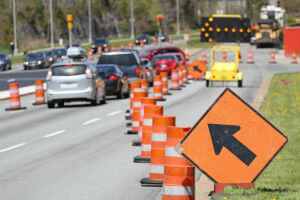A report published by the National Highway Traffic Safety Administration shows that blind spot accidents cause more than 18,000 injuries and 300 fatalities on U.S. roadways every year. Blind spot collisions are not specific to standard passenger vehicles as many often involve motorcyclists and commercial truck drivers as well. Liability is almost always assigned to the driver who attempted to change lanes or merge without a clear path. If you were injured in a Virginia Beach blind spot accident, you should consider working with an experienced Virginia Beach car accident lawyer from Shapiro, Washburn & Sharp to help determine who is at fault.
How Do Blind Spot Accidents Happen?
As it relates to driving, a blind spot is any area around a vehicle that is not readily visible to the driver. Blind spot car accidents occur when a driver tries to maneuver into another lane without realizing another vehicle is already there. There are three common causes of blind spot accidents that you, as a driver, need to be aware of. They are:
- Backing Up: Driving in reverse, even for a few feet, is one of the more challenging aspects of driving. If a reversing driver is oblivious to a vehicle in their blind spot, they can cause an accident, even if they are using their rearview mirror. Drivers who need to back up must always be on the lookout for other cars, cyclists, pedestrians, and motorcycles.
- Merging: Another leading cause of blind spot car accidents is merging, especially onto an interstate or highway. If a driver attempts to merge but is negligent in checking their blind spot, they can cause a serious accident.
- Changing lanes: Similar to merging, a driver who changes lanes without first ensuring they have a clear path can sideswipe another vehicle already in the area.
Who Is Liable For A Blind Spot Accident?
Establishing liability for a blind spot car accident is often challenging. In most cases, fault will be assigned to the driver who was trying to change lanes or merge with traffic. All drivers have a duty of care to understand their vehicle’s blind spots and monitor them appropriately to prevent an accident. Blind spot accident victims could argue that a prudent and reasonable driver would have known to check their blind spots under certain driving conditions. Liability can be less straightforward if one or both drivers also violate traffic laws.
Ultimately, an investigation will be conducted in order to correctly determine if one driver was at fault or if both were simultaneously negligent in checking their blind spots.
How Can I Prove Negligence In a Blind Spot Accident?
Due to Virginia’s pure contributory negligence laws, you have to prove you were not at fault for an accident in order to recover damages. In order to do so, you will have to show that the four elements of negligence were present:
- Duty: The other driver owed you a duty of care to drive safely, including monitoring their vehicle’s blind spots.
- Breach: The driver violated that duty by failing to check their blind spots before changing lanes or merging.
- Causation: The violation was the direct cause of your car accident.
- Damages: As a result of the accident, you incurred quantifiable damages.
Evidence that can help you establish negligence includes surveillance and dashcam videos, pictures of the accident scene, the police report, medical records, traffic citations, and witness statements.
Discuss Your Case With a Virginia Beach Car Accident Attorney
If you were seriously injured in a blind spot car accident in Virginia Beach, consider discussing your potential claim with an experienced Virginia Beach injury attorney. Blind spot collisions can be challenging, so the aid of an experienced attorney can be invaluable when it comes to securing fair compensation for your injuries, such as the $43,522 jury verdict we won for this client after she was struck by a driver attempting to enter a highway.
If you were injured in a car accident caused by a driver who failed to check their blind spots, contact Shapiro, Washburn & Sharp to schedule a free case review. You can call us at (833) 997-1774 or fill out our easy, online contact form. We have offices in Virginia Beach, Norfolk, Portsmouth, and Hampton.
